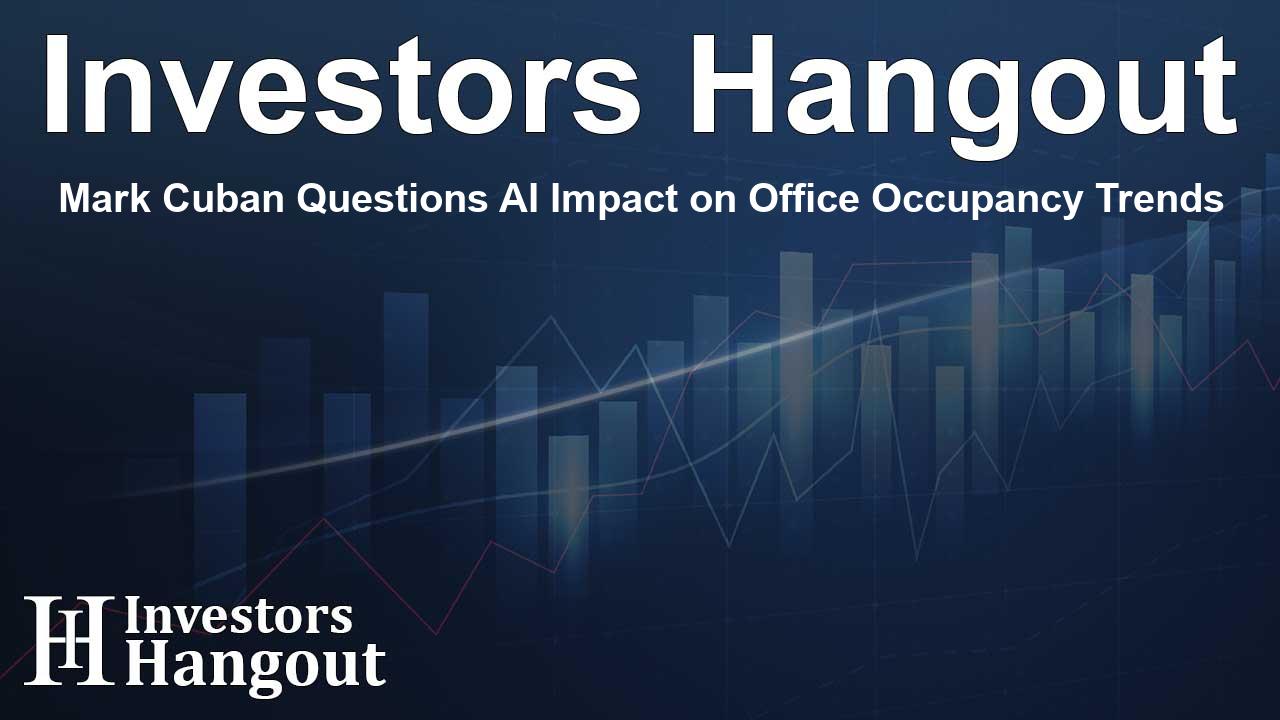Mark Cuban Questions AI Impact on Office Occupancy Trends

Mark Cuban Raises Questions About AI and Job Market Trends
Recently, Mark Cuban highlighted an intriguing phenomenon regarding the current state of office occupancy in major U.S. cities. Despite widespread concerns about AI and automation leading to job losses, Cuban wondered why office buildings are not experiencing significant declines in occupancy rates.
Cuban's Observations on Office Occupancy
On a popular social media platform X, Cuban articulated his perspective on the seeming disconnect. He suggested that if AI were poised to eliminate a substantial number of white-collar jobs, we should already be witnessing a downturn in office space utilization, especially in urban centers where major companies are headquartered.
Concerns Amid Layoffs
Cuban's remarks come in the wake of numerous layoffs at leading tech corporations that are increasingly deploying automation and AI technologies. The ongoing shift towards efficiency has left many professionals questioning their job security.
Counterarguments from AI Experts
In response, David Sacks, a notable figure in AI economics and advisor to Donald Trump, disagreed with the narrative that AI is a harbinger of widespread job losses. Instead, Sacks contended that the ongoing AI revolution is fostering greater demand for office spaces, particularly noted in tech hubs like San Francisco.
Job Cuts Among Tech Giants
Recent reports indicate that companies such as Oracle Corp ORCL have undergone significant workforce reductions, laying off around 10% of their staff in specific departments as they pivot towards advanced automation and AI integration.
Meanwhile, Meta Platforms, Inc. META notably implemented a stringent reduction strategy, which included cutting over 21,000 jobs in an effort to streamline operations and increase productivity.
The Push for Technological Efficiency
Many businesses are adopting aggressive strategies to embrace automation, following a trend exemplified by Meta's “Year of Efficiency.” This shift not only affects staffing but also their strategies to leverage AI for a more effective workforce.
Economic Insights on AI's Influence on Jobs
Economists, including Craig Shapiro, have voiced serious concerns about the structural challenges posed by AI-induced job displacement. Studies project that AI could impact 25% of the U.S. labor market by the end of this decade, with research suggesting as much as 47% of all jobs could be at risk.
Sector-Specific Effects of AI
Insights from the World Economic Forum suggest a dichotomy in how various industries experience these shifts. Traditional sectors such as construction and healthcare may face slower adaptation due to a lack of digital data, while industries rich in digital information, like software and finance, might witness rapid automation.
Trends in Employment and Office Demand
Currently, 75% of software developers are utilizing AI tools, and the growing proportion of algorithm-driven trading in financial markets exemplifies this trend. Moreover, predictions indicate that while approximately 92 million jobs could be displaced by 2030, new opportunities will emerge, although not necessarily in the same locations or requiring similar skill sets.
Conclusion
As the dialogue surrounding AI continues to evolve, both business leaders and the workforce must navigate the complexities and uncertainties that accompany these advancements. The effects of AI on job markets and workplace dynamics remain pressing topics, and ongoing dialogue will be crucial in shaping the future landscape of work.
Frequently Asked Questions
What did Mark Cuban question about AI and job displacement?
Mark Cuban questioned why there hasn’t been a significant decline in office occupancy despite fears that AI might lead to widespread job losses.
What was the response to Cuban’s comments?
David Sacks suggested that the AI boom might actually be increasing demand for office spaces rather than decreasing it.
What trends are seen among tech giants regarding workforce changes?
Tech giants like Oracle and Meta are cutting jobs as they shift towards embracing automation and AI technologies for operational efficiency.
How many jobs could AI potentially displace?
Studies suggest that AI could affect up to 25% of the U.S. labor market by 2030, with a substantial number of jobs at risk of automation.
What industries are most likely to be impacted by AI?
Sectors with significant digital data, such as software development and finance, are facing rapid automation, while more traditional sectors like construction may see slower but deeper impacts.
About The Author
Contact Kelly Martin privately here. Or send an email with ATTN: Kelly Martin as the subject to contact@investorshangout.com.
About Investors Hangout
Investors Hangout is a leading online stock forum for financial discussion and learning, offering a wide range of free tools and resources. It draws in traders of all levels, who exchange market knowledge, investigate trading tactics, and keep an eye on industry developments in real time. Featuring financial articles, stock message boards, quotes, charts, company profiles, and live news updates. Through cooperative learning and a wealth of informational resources, it helps users from novices creating their first portfolios to experts honing their techniques. Join Investors Hangout today: https://investorshangout.com/
The content of this article is based on factual, publicly available information and does not represent legal, financial, or investment advice. Investors Hangout does not offer financial advice, and the author is not a licensed financial advisor. Consult a qualified advisor before making any financial or investment decisions based on this article. This article should not be considered advice to purchase, sell, or hold any securities or other investments. If any of the material provided here is inaccurate, please contact us for corrections.
